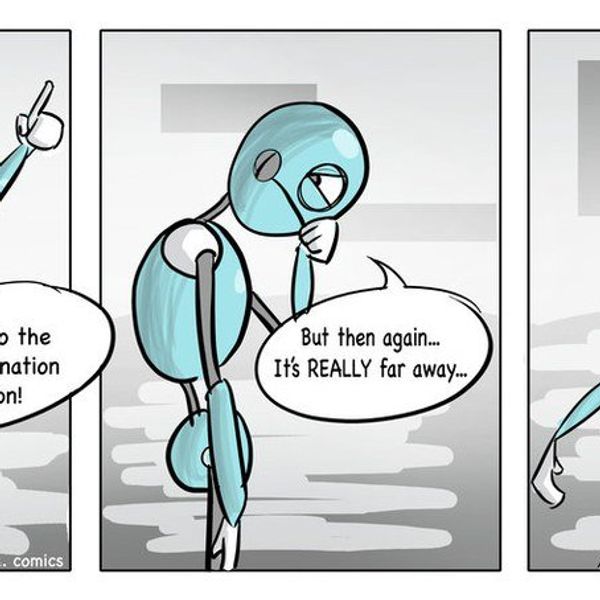I feel like all 12,000-plus AP Seminar students nationwide let out a collective groan when they saw this year's stimulus materials. In the 2014-2015 school year, the first year Seminar existed, these sources ran the gamut from the importance of learning to code to the cognitive benefits of dancing. Now, the common thread among all our sources is work, and not all of these sources have pros or cons neatly spelled out for us readers.
But there's no need to despair. The selection we've been given is still a goldmine, even though it might take considerably more effort to unearth a precious nugget. Here are my tips for coming up with the kind of compelling, multifaceted question that Performance Task 2 demands.
1. Consider what the sources DON'T mention (but should).
If you've read all of them, I'm sure you already know the basic ideas stated: Work is central to one's sense of identity. The rise of automation, including artificial intelligence, poses a threat to many jobs. This country prides itself on its work ethic. Working long hours apparently doesn't seem to cause cancer. You know what questions these ideas lend themselves to (e.g., "Is artificial intelligence good for society?"), but those questions all seem so unoriginal - and rightfully so.
A source truly serves as a "stimulus" when it makes you think beyond what's plainly written. So remember the oral defense question "What is a gap in your team's research that, if addressed, would make you more confident in your conclusion?" and in that vein, be on the lookout for gaps in the sources' reasoning and/or evidence that you can address!
2. Look at related sources that interest you more, and then look back.
Just looking up "work current events" for the sake of this post, I found a CNN article called "Not every liberal arts grad is working as a barista."
Surely this can lend itself to a strong question about the hot topic of college degrees' value in this job market. And it does effectively connect to some of our stimulus materials! The excerpt from The Wealth of Nations explains why a good chunk of young adults go into the "liberal" fields even knowing that these fields tend to have lower success rates, whereas "A World Without Work" discusses how the future of jobs, period, is being threatened.
So I encourage you to just do some casual preliminary research. But one thing's for sure - College Board will mark you down for having a question that's "only tangentially related to the context of the source materials." So if you love an outside source, but you feel like any possible "connection" would be too much of a stretch, it might be best to scrap it.
3. Think about a solution first.
An argument in AP Seminar is supposed to lead to a "solution, conclusion, or resolution," but in reality, all of the high scoring projects have practical implications beyond simply answering a question. Explicitly or implicitly, they provide a concrete call to action.
So, for any problem these sources identify - such as the loss of jobs to artificially intelligent machines, the heartache and ennui of the unemployed, or the struggle of women in the workplace - what are some currently debated solutions?
Perhaps instead of investigating the true impact of a problem, you can take it as a given that the problem is serious (with reasonable limitations, of course) and choose to explore a way that people have tried, or are trying, to solve it. If you don't already know, this is where preliminary research really comes in handy!
4. Make sure the question is definitely argumentative.
I learned the hard way earlier in the year (not in my actual Performance Task 1, thank goodness) that just because the answer to a question is debatable doesn't necessarily mean it'll be an argument in the audience's eyes. What distinguishes an argument, at least in the context of Seminar, is the presence of some kind of subjective judgment.
A question like, say, "How does working under capitalism shape people's sense of purpose and identity?" can be answered in an expository paper. Changing it to something like "Does working under capitalism have a positive impact on people's sense of purpose and identity?" would require the writer to weave the facts into a clear line of reasoning, rich with thoughtful commentary.
Aside from that "Is this present phenomenon good or bad?" format, it seems like future-focused questions, in the style of "How should...?" or even just "Should...?", also tend to turn out strong.
~~~
It seems like with the sources we've been given for Performance Task 2, finding a good research topic that isn't overdone may be the hardest part. But I hope that with these strategies, it'll be much easier to craft a question you'll love.
Good luck!

























